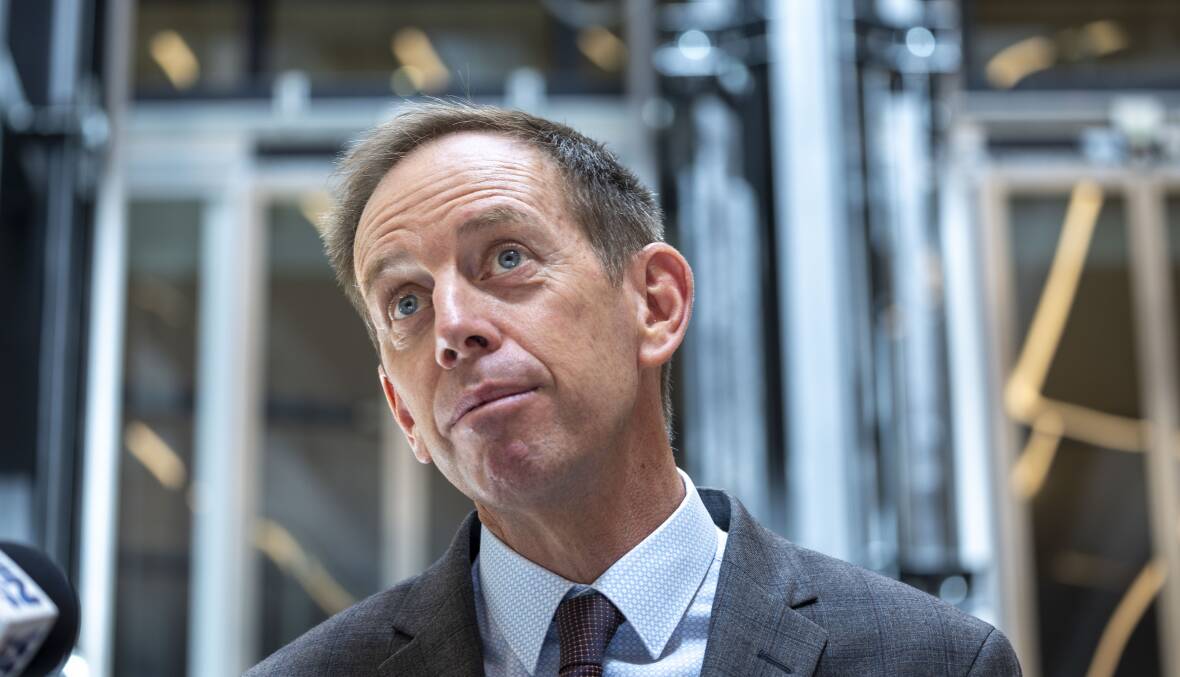Gaming Minister Shane Rattenbury has been challenged by a Labor backbencher to justify a push for the "dud policy" of installing an expensive system to centrally monitor the use of poker machines in the territory.
Marisa Paterson suggested the cost of the system could dissuade future efforts to reduce the number of poker machines in the territory, and on Wednesday used a parliamentary inquiry to challenge Mr Rattenbury's belief in the proposal.
Mr Rattenbury, the Greens leader, said the system was a necessary precursor to introduce new gambling harm minimisation policies, including loss limits. He also defended the time taken to introduce the system, noting the matter had gone to cabinet multiple times.
"You may not accept or agree with that proposal. If that's what you're saying, you just say that," Mr Rattenbury told Dr Paterson in a public hearing of the Legislative Assembly's standing committee on justice and community safety.
Dr Paterson, a former director of the Australian National University's centre for gambling research, asked whether spending the expected $70 million required to install a central monitoring system would lock the ACT into having 3500 poker machines indefinitely.
"Minister, can I put it to you that we have a dud policy in the [parliamentary and governing] agreement that to implement requires a $70 million, approximately, central monitoring system that in and of itself is an administrative tool, and we have no idea as a jurisdiction where we're going in terms of what our harm minimisation policies may be, what works, what doesn't," she said.
Mr Rattenbury said he fundamentally rejected that proposition.
"I understand people's potential reservation at spending some material amount of money on such a system. But my question in response is at what price are we not willing to address gambling harm in the territory?" Mr Rattenbury said.
"I think this is a price we need to be willing to pay for an industry that's pulling around $180 million a year in profit."

Mr Rattenbury also defended the time he had taken to progress new limits on poker machines, which were included in the governing agreement struck between Labor and the Greens after the 2020 election.
"These matters have been to cabinet on quite a number of occasions to get to the point we've got to. I need to also work with my colleagues, and that is not always a quick process," he said.
The government last week announced it had begun a four-week market sounding project to find a suitable central monitoring system, nearly two years after releasing a discussion paper.
The central monitoring system would link up all electronic gaming machines in the territory, allowing data to be captured and authorities to monitor their use. The system would also allow the government to introduce loss limits and cashless gaming, the government has said.
Mr Rattenbury said he considered loss limits to be the most important policy the government could introduce to reduce gambling harm, but indicated a central monitoring system would be required first.
"At the end of the day, poker machines are designed to be addictive. That is clear. And so you can put in place things like self exclusion, you can put in place other measures," Mr Rattenbury said.
"But my view - and based on the research undertaken and provided me - is that we need to put guard rails around poker machines. We need to put limits in place so that people can't lose the family savings and all the other associated harms that go with excessive use of poker machines."
Dr Paterson asked what evidence informed Mr Rattenbury's view that the ACT could copy Tasmanian-style loss limits, which prevent gamblers from losing more than $5000 a year, $500 a month and $100 a day.
The limits, if applied in the ACT, would still allow gamblers in the ACT to incur significant financial losses, Dr Paterson said, who said Mr Rattenbury was "spruiking policies that don't have evidence-based backing".
But Mr Rattenbury rejected the suggestion the government had not researched the proposals, and said the point was the ACT currently had no limits in place on the amount gamblers could lose on poker machines.
"Clubs in the ACT will take as much of your money as they can get from you through a poker machine. What I'm seeking to do here is ensure there are limits," he said, adding his plan was an "enormous advance".
Mr Rattenbury said he had significant reservations about using facial recognition to run schemes that allow gamblers to ban themselves from venues, citing privacy concerns.
"If it's used in that way as part of a self-exclusion regime, it very much operates as the ambulance at the bottom of the cliff, in the sense that by the time somebody has got to self exclusion, they have usually experienced significant gaming harm," he said.
Clubs ACT later told the inquiry self-exclusion schemes were worthwhile but were not effective without facial recognition technology.
Gambling and Racing Commission chief executive Yu-Lan Chan told The Canberra Times tougher limits to limit gamblers' losses on poker machines would be a "helpful step".
Mr Rattenbury introduced a bill to the Legislative Assembly last week to establish a compulsory gaming machine acquisition scheme to ensure the ACT meets a 3500-machine target next year.
Mr Rattenbury said he believed the territory would reach the target through a voluntary licence buy-back scheme without needing to force clubs to hand over licences.







